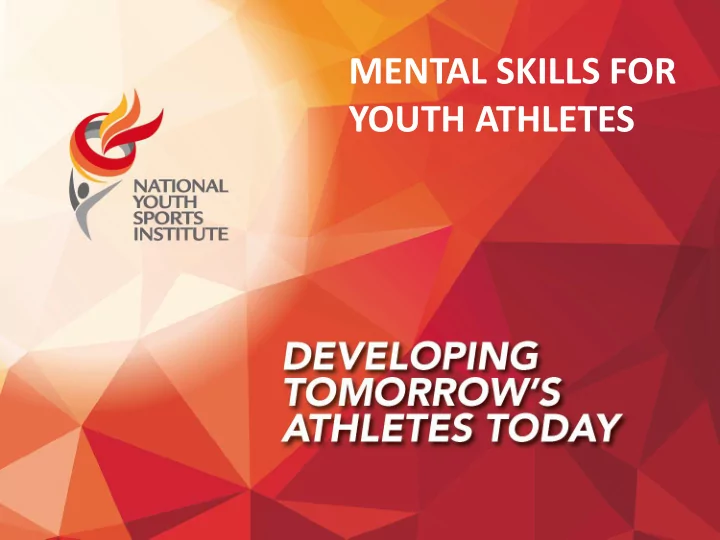

MENTAL SKILLS FOR YOUTH ATHLETES
Topics for today… Goal – setting for increased motivation and focus Imagery for better performance Managing expectations: both internal and external
Goal - Setting
BUT… Joseph Schooling “If it wasn’t for Michael, I don’t think I could have gotten to this point. I wanted to be like him as a kid,” Schooling said. “I Perf erfor orman mance ce think a lot of this is mental men tal sk skil ills ls because of Michael. He is the reason why I wanted to be a better swimmer.” https://www.theguardian.com/sport/2016/aug/13/michael- phelps-taught-a-lesson-for-once-by-singapores-joseph- schooling
BUT… Goal-setting Guidelines Goals should be SPECIFIC and address what you plan to do. Include as much S detail as possible, such as dates, ranking points, positions, times that you will need to accomplish your goal. They should be MEASURABLE, such that it can be quantified. Establish M criteria and milestones along the way to keep track of progress. Perf erfor orman mance ce Goals should be ACHIEVABLE. They should not be too easy to attain or on A mental men tal sk skil ills ls the other hand, completely out of reach. Goals should be set just outside of your reach but with time and effort you will attain them. They should be RELEVANT in that goals are connected/linked to what you R set out to accomplish. Goals should be TIME-BOUND. Set timelines which are realistic yet T challenging; a timeframe that will give you a sense of urgency.
NOT SMART vs. SMART Not Specific I want to be a great swimmer. S Specific I want to be ranked no. 1 in Singapore by 2017. Not Measurable I want to make many good passes in the game. M Measurable I want to make 10 successful passes to a team-mate. Not Achievable I want to score 100 goals in every game. A Achievable I want to score at least 1 goal per game. Not Relevant I want to go to Tokyo Disneyland. R Relevant I want to go to Tokyo 2020 Olympics. Not Time-Bound I want to improve my endurance. T Time Bound I want to improve my endurance within 3 months.
BUT… Types of goals Focuses on the specifics of a PROCESS procedure in which the performer will engage during performance. Focuses on improvements PERFORMANCE relative to one’s own performance. Focuses on the results or OUTCOME some form of standards in reference to somebody else.
BUT… • 15 mins of extra sprint PROCESS training to improve endurance • Proper execution of kicking technique • Eat healthily to manage weight
BUT… • Take 5 shots at goal during the match PERFORMANCE • Improve beep test results by 2 levels • Lose 2kg without muscle loss
BUT… • Score a goal every game • Be national age-group OUTCOME 100m champion • Make national youth team
Trisha, 11 year old netball player, wants to become starting goal shooter for School. Outcome Process Performance Clean execution of shooting Become starting goal technique, focusing on full Increase shooting percentage to > shooter for school by end extension of arm and flick of 90% per game of 2017. wrist. Practice 50 clean shots after Taking at least 10 shots per game, every netball training for 2 at National Schools in April 2017. months SHORT-TERM LONG-TERM MID-TERM 1 month ~ 3 months 6 months ~ 1 year 3 months ~ 6 months
IMPORTANT!!! REVIEW REFLECT
Goal-setting System • Convey goal setting messages • Stimulate athlete thinking on goal setting • Discussion on potential goals • Seek consensus Planning Meeting Evaluation • • Identify athletes/teams needs Provide feedback • • Identify potential goals Evaluation sessions to monitor • Consider possible strategies that can assist in goal achievement
BUT… Advice… Use a combination of process, Use positive, instead performance, and of negative wording outcome goals Move focus away Perf erfor orman mance ce from outcome goals Athlete ownership of mental men tal sk skil ills ls as competition goals approaches Identify action plans/strategies to achieve goals
Imagery
Ima Imager gery r y relies elies on on your se our senses nses of: of: • Sight Sight • Smell Smell • Taste aste • Hearing Hearing • Touc ouch • Feel* eel*** **
Vividness ividness Contr Controlla ollability bility Self Self-aw awar areness eness
Imagery Use Skill Acquisition/motor Self-confidence Relaxation readiness • • • Recall of good past Virtual stress-free space Learn new skills performances • • Decrease general Correct mistakes in • arousal levels Imagine positive technique outcomes in • Increase neural- competition muscular activation • Provides mental focus
BUT… Advice… Keep it simple Perf erfor orman mance ce Frequent practice Clearer images give builds imagery ability better outcomes mental men tal sk skil ills ls Imagery should incorporate all the senses
Managing Expectations
Sources of Expectations Managing Internal External Parents Self Peers Coaches
Long term Managing development External Task oriented training environment Process over Parents outcome Excellence over Peers success Coaches
Know your current level Managing Be realistic Internal Failure is an opportunity to grow Self Prepare for the worst, hope for the best Control the controllables
Controllables Uncontrollables Managing My warm up routine Officials My techniques Judges My strategy Competitors My strengths Cheering Preparations (Enough Environment sleep, food, hydration) Getting to competition on Crowds time
How to manage? Managing Step 1. Identify expectations Step 2. Challenge unrealistic expectations Step 3. Replace with more realistic expectations through a focus the process Step 4. Ensure external pressures sing the same tune
BUT… Advice… Acknowledge individual differences Perf erfor orman mance ce Build self-awareness Better understand in your athletes your athletes men mental tal sk skil ills ls Focus on the fun and enjoyment
Final notes… Managing Mental skills are just like • physical/technical skills and require frequent practice As much as possible, weave the practice • of mental skills into training Bear in mind the holistic long-term • development of the youth athlete
THANK YOU FOR YOUR TIME! ANY QUESTIONS??? Contact Dr Harry Lim harry_lim@nysi.org.sg www.nysi.org.sg
Recommend
More recommend